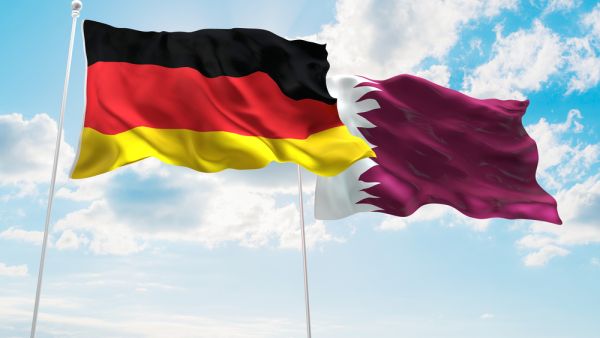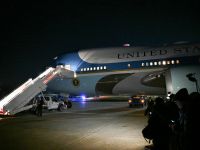Qatari-German trade ties have gained considerable momentum in recent times, Minister of Commerce and Industry HE Ali bin Ahmed Al Kuwari has said.
More than $2.311 billion worth of goods exchanged in 2019, ranking Germany as Qatar’s 11th largest trade partner, he added while addressing a webinar on Qatar’s business and investment environment on Tuesday.
The event was organised by Qatar Embassy in Berlin in cooperation with the German Near and Middle East Association (NUMOV).
The minister said a total of 332 German companies were currently operating in Qatar, including 270 Qatari-German companies, 46 fully-owned German companies and two German representative offices, in addition to 14 companies licensed under the umbrella of Qatar Financial Centre.
The minister said these companies were contributing to the implementation of several major projects in the infrastructure sector such as Qatar Rail, as well as the development of key stadiums for the 2022 FIFA World Cup, in addition to other vital ventures in various fields.
Kuwari noted that Qatar had made significant investments in a range of German industries, especially following the historic visit of HH the Amir to Germany in September 2018, during which the Amir announced Qatar’s intention to invest 10 billion euros into the German economy over the five years up to 2023.
He said the meeting presented another opportunity to build on what both sides achieved during the Qatari-German Joint Commission on Trade, Economic and Technical Cooperation, expressing his aspiration to hold the next session of the Joint Commission in Doha in 2021.
Kuwari referred to the directives of His Highness the Amir Sheikh Tamim bin Hamad Al Thani to support and provide financial and economic incentives in the form of a QR75 billion incentive package to the private sector.
He also highlighted QDB’s initiative to launch the National Guarantee Programme, which aims at helping private sector companies overcome the challenges posed by the COVID-19 pandemic.
The minister shed light on the stimulating investment environment in Qatar and the new laws and regulations governing the business environment.
In particular, he highlighted the law on regulating the partnership between the public and private sectors, which aims to enhance economic diversification and further the private sector’s contribution to national development.
Highlighting the importance of the webinar, Kuwari said provided a platform for dialogue between the Qatari and German private sectors, for SMEs and entrepreneurs to discuss opportunities to cooperate in areas that will contribute to strengthening economic and commercial ties between the two nations.
The conference was attended by Qatar’s former ambassador to Germany Mohammad Jaham Al Kuwari, Qatar Development Bank (QDB) CEO Abdulaziz bin Nasser Al Khalifa, Qatar Financial Centre Authority CEO Yousuf Mohamed Al Jaida and Investment Promotion Agency of Qatar CEO Sheikh Ali Alwaleed Al Thani.
From the German side, the conference drew the participation of Thomas Bareib,
Parliamentary State Secretary at the Federal Ministry for Economic Affairs and Energy & Co-Chairman of the Qatari-German Joint Commission on Trade, Economic and Technical Cooperation; Claudius Fischbach, German Ambassador to Qatar, and Niko Warbanoff, Member of the Board of NUMOV and Chairman of the Board of DB Engineering & Consulting.
Minister Kuwari congratulated Sheikh Abdulla bin Mohammed bin Saud Al Thani for his appointment as ambassador to Germany and Claudius Fischbach on his appointment as ambassador of Germany to Qatar.
For his part, Mohammad Jaham Al Kuwari, the former Ambassador of Qatar to Germany, praised the close partnership between the two countries, which covers a wide range of political, cultural and particularly economic areas.
The envoy added that Qatar is strongly committed to further intensifying the excellent relations between the two nations as a strategic objective, especially in light of the immense challenges that the world is currently facing.
The highest priority is to defeat the global corona pandemic and return to sustainable economic growth and stable international trade, Jaham Al Kuwari said.
He stressed the importance of the conference, as it contributes to further strengthening the outstanding cooperation and networks, as well as attracting new entrepreneurial opportunities allowing both nations to face the global challenges ahead with strong economic, political and sustainable commitment.
Even though the COVID-19 pandemic has hit the global economy hard, the strength of Qatar’s economy and companies remains evident, he added.
In this context, the former ambassador hailed the efforts of globally operating companies such as Qatar Airways, which has significantly expanded its market share. When compared with its neighbours in the Gulf region, Qatar’s economy is also proving its strength under pressure, he added.
The envoy said Qatar offers great possibilities and opportunities to German companies.
Partly due to its geographical location, Qatar has developed into a global trading centre that offers excellent conditions for production facilities with secure energy supplies, he said.
The envoy also shed light on Qatar’s advanced logistical, financial and digital infrastructure, in addition to the free industrial zones that are witnessing continuous expansion, creating the conditions and environment conducive to long-term investments and sustainable growth.
The webinar included a panel discussion entitled ‘Invest in Qatar’.
Abdulaziz bin Nasser Al Khalifa, Yousuf Mohamed Al Jaida and Sheikh Ali Alwaleed Al Thani participated in the session.
The discussion shed light on the investment opportunities available in Qatar, as well as the facilities provided by the state to foreign investors, including small and medium companies and other foreign firms.
For his part, the QDB CEO thanked the event organisers for opening new doors for collaboration between Qatari and German companies and institutions, which he said is a testimony to the continuous efforts of the Qatari-German Joint Economic Commission in advancing the two countries’ economic agendas.
Khalifa pointed out that the COVID-19 pandemic has acted as a warning to create a more resilient infrastructure and business ecosystem. He added that since the virus outbreak, QDB has launched several initiatives within the framework of a trilateral strategy to help SMEs survive the pandemic, revive their businesses amid ongoing challenges, and ultimately thrive in the new economy.
These initiatives include releasing the COVID-19 ‘survival’ guidebook and the Revive guidebook, which acts as a complete reference for entrepreneurs who want to reinvigorate their businesses in the post-recovery phase.
Sharing his outlook on the future of entrepreneurship in Qatar, Khalifa said that QDB and its affiliate institutions will continue to provide SMEs with all the tools and resources they need in the areas of finance, knowledge and skills development, while also helping them to successfully extend their footprint, including through collaboration with their German counterparts to achieve more growth and contribute to the economic development of both nations.
Jaida, the CEO of QFC Authority, said, “Qatar has been at the forefront in maintaining its thriving economy and strengthening its lucrative investment eco-system, which are integral factors for attracting German investments into the Qatari Market. Although the COVID-19 pandemic confronted Qatar, and the rest of the world, with many challenges, it has however created new avenues of investment in Qatar, which is offering a diversified multitude of business opportunities.
“Backed by our host of premium benefits and incentives, QFC proudly pursues its role as a core enabler for German firms to access Qatar’s lucrative market and establish their business through a seamless unique journey. The QFC platform, one of the world’s leading and fastest-growing onshore business and financial centres, is currently home to 14 German firms, and we look forward to welcoming more very soon.”
For his part, the Investment Promotion Agency of Qatar CEO said, “As businesses continue to transform for the new economy, many investment opportunities are emerging across sectors, and we see plenty of prospects for German-Qatari collaboration as we move towards a digital economy, where business, communication, and consumer experiences are re-imagined. This includes areas such as Fintech, e-health, e-learning, virtual entertainment, and many others. Backed by the country’s resilient economy, forward-looking vision, and strategic national initiatives, the Invest Qatar ecosystem is now more prepared than ever to support existing investors and welcome new international partners to Qatar.”
More than $2.311 billion worth of goods exchanged in 2019, ranking Germany as Qatar’s 11th largest trade partner, he added while addressing a webinar on Qatar’s business and investment environment on Tuesday.
The event was organised by Qatar Embassy in Berlin in cooperation with the German Near and Middle East Association (NUMOV).
The minister said a total of 332 German companies were currently operating in Qatar, including 270 Qatari-German companies, 46 fully-owned German companies and two German representative offices, in addition to 14 companies licensed under the umbrella of Qatar Financial Centre.
The minister said these companies were contributing to the implementation of several major projects in the infrastructure sector such as Qatar Rail, as well as the development of key stadiums for the 2022 FIFA World Cup, in addition to other vital ventures in various fields.
Kuwari noted that Qatar had made significant investments in a range of German industries, especially following the historic visit of HH the Amir to Germany in September 2018, during which the Amir announced Qatar’s intention to invest 10 billion euros into the German economy over the five years up to 2023.
He said the meeting presented another opportunity to build on what both sides achieved during the Qatari-German Joint Commission on Trade, Economic and Technical Cooperation, expressing his aspiration to hold the next session of the Joint Commission in Doha in 2021.
Kuwari referred to the directives of His Highness the Amir Sheikh Tamim bin Hamad Al Thani to support and provide financial and economic incentives in the form of a QR75 billion incentive package to the private sector.
He also highlighted QDB’s initiative to launch the National Guarantee Programme, which aims at helping private sector companies overcome the challenges posed by the COVID-19 pandemic.
The minister shed light on the stimulating investment environment in Qatar and the new laws and regulations governing the business environment.
In particular, he highlighted the law on regulating the partnership between the public and private sectors, which aims to enhance economic diversification and further the private sector’s contribution to national development.
Highlighting the importance of the webinar, Kuwari said provided a platform for dialogue between the Qatari and German private sectors, for SMEs and entrepreneurs to discuss opportunities to cooperate in areas that will contribute to strengthening economic and commercial ties between the two nations.
The conference was attended by Qatar’s former ambassador to Germany Mohammad Jaham Al Kuwari, Qatar Development Bank (QDB) CEO Abdulaziz bin Nasser Al Khalifa, Qatar Financial Centre Authority CEO Yousuf Mohamed Al Jaida and Investment Promotion Agency of Qatar CEO Sheikh Ali Alwaleed Al Thani.
From the German side, the conference drew the participation of Thomas Bareib,
Parliamentary State Secretary at the Federal Ministry for Economic Affairs and Energy & Co-Chairman of the Qatari-German Joint Commission on Trade, Economic and Technical Cooperation; Claudius Fischbach, German Ambassador to Qatar, and Niko Warbanoff, Member of the Board of NUMOV and Chairman of the Board of DB Engineering & Consulting.
Minister Kuwari congratulated Sheikh Abdulla bin Mohammed bin Saud Al Thani for his appointment as ambassador to Germany and Claudius Fischbach on his appointment as ambassador of Germany to Qatar.
For his part, Mohammad Jaham Al Kuwari, the former Ambassador of Qatar to Germany, praised the close partnership between the two countries, which covers a wide range of political, cultural and particularly economic areas.
The envoy added that Qatar is strongly committed to further intensifying the excellent relations between the two nations as a strategic objective, especially in light of the immense challenges that the world is currently facing.
The highest priority is to defeat the global corona pandemic and return to sustainable economic growth and stable international trade, Jaham Al Kuwari said.
He stressed the importance of the conference, as it contributes to further strengthening the outstanding cooperation and networks, as well as attracting new entrepreneurial opportunities allowing both nations to face the global challenges ahead with strong economic, political and sustainable commitment.
Even though the COVID-19 pandemic has hit the global economy hard, the strength of Qatar’s economy and companies remains evident, he added.
In this context, the former ambassador hailed the efforts of globally operating companies such as Qatar Airways, which has significantly expanded its market share. When compared with its neighbours in the Gulf region, Qatar’s economy is also proving its strength under pressure, he added.
The envoy said Qatar offers great possibilities and opportunities to German companies.
Partly due to its geographical location, Qatar has developed into a global trading centre that offers excellent conditions for production facilities with secure energy supplies, he said.
The envoy also shed light on Qatar’s advanced logistical, financial and digital infrastructure, in addition to the free industrial zones that are witnessing continuous expansion, creating the conditions and environment conducive to long-term investments and sustainable growth.
The webinar included a panel discussion entitled ‘Invest in Qatar’.
Abdulaziz bin Nasser Al Khalifa, Yousuf Mohamed Al Jaida and Sheikh Ali Alwaleed Al Thani participated in the session.
The discussion shed light on the investment opportunities available in Qatar, as well as the facilities provided by the state to foreign investors, including small and medium companies and other foreign firms.
For his part, the QDB CEO thanked the event organisers for opening new doors for collaboration between Qatari and German companies and institutions, which he said is a testimony to the continuous efforts of the Qatari-German Joint Economic Commission in advancing the two countries’ economic agendas.
Khalifa pointed out that the COVID-19 pandemic has acted as a warning to create a more resilient infrastructure and business ecosystem. He added that since the virus outbreak, QDB has launched several initiatives within the framework of a trilateral strategy to help SMEs survive the pandemic, revive their businesses amid ongoing challenges, and ultimately thrive in the new economy.
These initiatives include releasing the COVID-19 ‘survival’ guidebook and the Revive guidebook, which acts as a complete reference for entrepreneurs who want to reinvigorate their businesses in the post-recovery phase.
Sharing his outlook on the future of entrepreneurship in Qatar, Khalifa said that QDB and its affiliate institutions will continue to provide SMEs with all the tools and resources they need in the areas of finance, knowledge and skills development, while also helping them to successfully extend their footprint, including through collaboration with their German counterparts to achieve more growth and contribute to the economic development of both nations.
Jaida, the CEO of QFC Authority, said, “Qatar has been at the forefront in maintaining its thriving economy and strengthening its lucrative investment eco-system, which are integral factors for attracting German investments into the Qatari Market. Although the COVID-19 pandemic confronted Qatar, and the rest of the world, with many challenges, it has however created new avenues of investment in Qatar, which is offering a diversified multitude of business opportunities.
“Backed by our host of premium benefits and incentives, QFC proudly pursues its role as a core enabler for German firms to access Qatar’s lucrative market and establish their business through a seamless unique journey. The QFC platform, one of the world’s leading and fastest-growing onshore business and financial centres, is currently home to 14 German firms, and we look forward to welcoming more very soon.”
For his part, the Investment Promotion Agency of Qatar CEO said, “As businesses continue to transform for the new economy, many investment opportunities are emerging across sectors, and we see plenty of prospects for German-Qatari collaboration as we move towards a digital economy, where business, communication, and consumer experiences are re-imagined. This includes areas such as Fintech, e-health, e-learning, virtual entertainment, and many others. Backed by the country’s resilient economy, forward-looking vision, and strategic national initiatives, the Invest Qatar ecosystem is now more prepared than ever to support existing investors and welcome new international partners to Qatar.”








